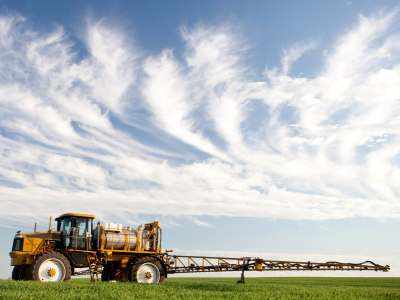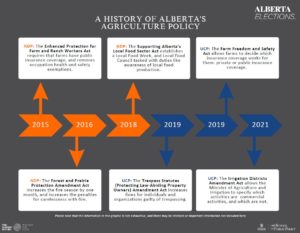What can the Past Eight Years Teach Us Leading up to Alberta’s Provincial Election?

On May 29, 2023, Albertans will go to the polls and cast a vote that reflects their vision for the future of Alberta. Politics are complicated, and determining which party or candidate to vote for can be challenging. While you’re sorting through campaign messages to decide who to vote for, This blog offers a historical perspective on policymaking for each party that can give insights into what has been accomplished for the sector in the past and how this could inform our discussions in the upcoming election.
Are you curious about how Alberta’s two most recent governments, the New Democratic Party (NDP) and the United Conservative Party (UCP), impacted the agricultural sector? Since 2015, the Government of Alberta has passed lots of legislation relevant to Albertan farmers. In scanning news and media outlets, certain policy decisions stood out as being widely discussed by Albertans, and as having a significant impact on the lives of Albertan farmers.
For example the 2018 Supporting Alberta’s Local Food Sector Act established a Local Food Council and a Local Food Week in August each year, under the NDP government. The 2019 Trespass Statutes (Protecting Law-Abiding Property Owners) Amendment Act protected farmers from protestors by creating more severe punishments for trespassers, under the UCP. Two other significant pieces of legislation revolved around workplace safety: The Enhanced Protection for Farm and Ranch Workers Act and the Farm Freedom and Safety Act. A closer look at these two Acts can help us appreciate the unique approaches adopted by the NDP and the UCP.

The NDP passed the Enhanced Protection for Farm and Ranch Workers Act in 2015. This Act made public insurance coverage for farms mandatory. It also removed exemptions from occupational health and safety laws. For example, it repealed sections 2(3) and (4) of the Employment Standards Code, which specified that regulations such as overtime pay, vacation pay, and restrictions on the employment of children do not apply to employees working in the primary production of eggs, milk, livestock, and grain, among other commodities. The NDP required that farmers have public insurance coverage in order to promote workers’ safety.
In 2019, the UCP passed the Farm Freedom and Safety Act in response to the NDP’s Enhanced Protection for Farm and Ranch Workers Act. This Act allows farmers to opt for either private or public insurance coverage. The Act also amends the Employment Standards Code by expanding the list that defines who is employed in farming and ranching and including those employed in the primary production of mushrooms, sod, trees, shrubs, and plants. With this Act, the UCP looked to give farmers more choice in decisions about their daily operations. Allowing the choice of either public or private insurance.
Comparing these two distinct approaches to workplace safety is one way that we can reflect on how our own ideals might align with past policy decisions of the NDP and UCP as we go into the elections. The full report on the past 8 years of policymaking can be found on the Simpson Centre’s website: https://www.simpsoncentre.ca/events/alberta-elections/
Later in April, we’ll share the results of a recent survey that we conducted with primary producers. What are the priorities of farmers in Alberta going into the next election? We’re just as excited as you are about the next round of updates.
The Simpson Centre is a policy research institute affiliated with the School of Public Policy at the University of Calgary. We are committed to strengthening Canada’s agriculture sector through evidence-based research and analysis. Our aim is to provide research in an accessible and transparent way, to promote better conversations between industry, government, and the public.


